How to WRESTLE with Life: Lessons from Jesus, Buddha, and the Stoics
I have assigned a lot of meaning to the physical, psychological, and emotional experiences wrestling has given me. The word itself represents something far more to me than its simple definition. I know this is true for many of you as well. Or, it may be true for you in regards to some other pursuit, like mathematics, dance, writing, or running marathons. Each of these things, to their dedicated disciples, carries far more significance than it does for someone who has neither passion nor experience in the domain.
As I learn about things outside of the wrestling room, I notice myself asking how these fresh insights might also be applied to wrestling. It’s like this, maybe you’ve played a lot of Monopoly and you’ve also played a lot of Settlers of Catan. In this case, you’ll find yourself trying to identify the useful tactics that exist between the two games. If you are highly experienced in writing novels, you might see the discipline it takes to run marathons in a familiar light. It’s likely that you will take some strategies from one and apply them to the other. In the same right, a champion tennis player might see the volleyball court in terms of her already well-established tennis schemes. I’ve spent a lot of time with wrestling, and far less time with philosophy. But, just like the veteran tennis player who sees volleyball as a game of tennis, I like to consider philosophy as it relates to wrestling.
Buddhism, Christianity, and Stoicism are a few ancient religious and philosophical belief systems that are meant to teach us how to play the game of life better. They each have a set of rules and convictions, and by understanding them, you might also develop a deeper understanding of yourself and your experience as a wrestler. Wrestling, or whatever your discipline, is a microcosm of life as a whole.
Buddhist philosophy states that there are 4 Noble Truths which can be applied to life. The first of these truths is that life involves suffering. Wrestling requires a certain tolerance for discomfort. Injuries are painful. What’s more is the physical exhaustion that is sure to rear its ugly head nearly every practice and every workout – this being the most consistent and significant form of physical discomfort that wrestlers encounter. And then there is the emotional pain, of which wrestling delivers a distinct and bitter flavor. This unique flavor of suffering comes from exposure to a certain style of defeat, a style that places the responsibility of the loss, in front of friends, family and teammates, almost entirely on the shoulders of the individual. So, although wrestling is exceptionally fun and exciting, it also involves suffering.
The good news is that many philosophies are dedicated to transforming suffering into something special. What the Buddhist philosophy tells us is that this hardship is not unnatural or wrong. That it does not need to be removed from the equation. Fear of failure, exhausting workouts, weight cutting, and lost matches are instrumental phases in reaching our potential. Once we have seen and accepted this inconvenient truth, we can finally stop pushing discomfort away and begin to lean into it. We waste less energy trying to stop suffering, and begin to embrace it for the beautiful and virtuous process it fulfills – becoming a better version of ourselves. The Dali Lama said,
“Pain is inevitable. Suffering is optional.”
Jesus also happened to know a thing or two about transforming suffering into meaning and beauty. Let me explain, I am not saying you have to believe everything the Bible says in order to benefit from the essence of the archetypal stories it offers. Regardless of whether you believe this is the story of God’s time on earth, or that it is just a fictional heroic tale, there is wisdom that should be considered. You might enjoy tennis more than volleyball, but you can learn something about the former from the later. If the stories in the Bible did not resonate and reflect some fundamental human wisdom, they would not remain after thousands of years. Stories that fail to resonate in some deep way with our inner truth do not get retold. And this one has been retold a lot.
The most well-known story in the Bible goes something like this. Jesus was unjustly convicted of blasphemy and sentenced to death on the cross. He wondered whether there might be an easier way. The night before his death, Jesus asked God if there was any other way for him to fulfill his calling without such suffering. As the story goes, there was no other way, and Jesus accepted it willingly. The following day, Jesus put his cross on his back and carried it to the top of the hill to be crucified.
What is this archetypal story telling us? By example, that fulfilling our greatest purpose and our calling will involve discomfort. Jesus knew that the path which led to his highest self – his transformation and resurrection, would be through the acceptance of his suffering on the cross. And in doing so, his suffering was transformed into a meaning which has had an unimaginable impact on the rest of the world. His story, whether God or man, is one that has inspired and guided many others to courageously transform their struggles into a personal journey through which they have discovered purpose and transformation toward a better self.
The Stoic philosophers use another term for the path God has laid out. They use Nature with a capital N to refer to that mysterious something that is beyond our understanding, a higher power. I like to think of this higher power, this Nature, as the incomprehensible source which seems to unveil our life path by generating our interests and passions. We move toward the things that we feel excited and passionate about, and away from the things that bore us. And since we don’t exactly know what is generating our interests and passions, we can call it Nature, or God, or Fate, or maybe even our Potential Self. In his journal nearly two-thousand years ago, Stoic philosopher Marcus Aurelius described the importance of accepting suffering as he wrote:
“Moreover, the pursuit of pleasure as a good and the avoidance of pain as an evil constitutes sin… Those who wish to follow Nature and share her mind must themselves be indifferent to those pairs of opposites to which universal Nature is indifferent”
Sin, as Marcus describes it above, is the regretful sacrifice of one’s calling in order to avoid discomfort. He also emphasized man’s ability to create meaning through adversities,
“the reasonable creature can make every obstacle material for himself and employ it for whatever kind of purpose he has set out upon.”
What we are constantly wrestling with, is the gap between what we are and what we could be. There is a part in each of us that wants to stay in the same place of comfort, and another part of us that longs to continue the journey toward our potential. What wrestling has told me, which philosophy has echoed, is that pursuing your calling with wholehearted abandon will involve both joy and suffering. And that, through this pursuit, you are given a way to transform difficulty into something valuable. Have the courage to carry your cross up the path which leads to the death of your old self, and the resurrection of your potential self. It will be unique to you. Follow that mysterious source, that ancient energy which creates your passions, aspirations, and love. In return for your courage and willingness to accept the discomfort of fear, discipline, failure, and responsibility, you will be given meaning. And perhaps through this process, you will have done your fair part in making the world a better place.
Ok. Enough philosophizing. We’ve got our life’s work to do.
By Joe Nord









